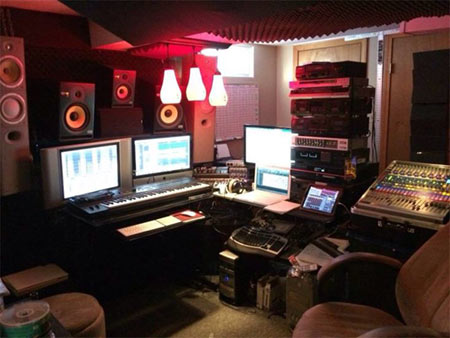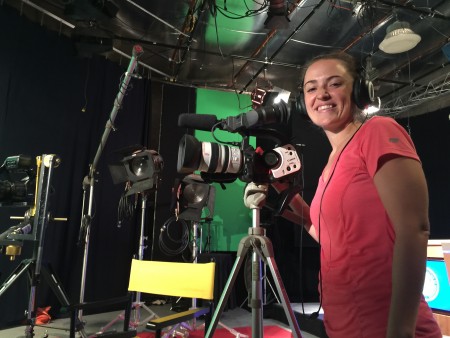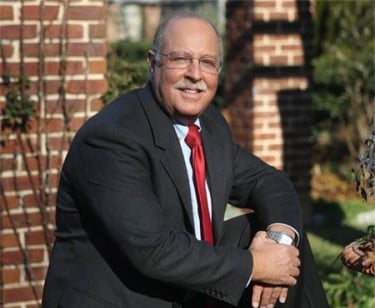With more than 30 years of professional music industry experience, there’s little that Recording Connection mentor Doug Wallace hasn’t seen. Since beginning as a drummer and guitarist, playing in several bands, then moving to the production helm, Doug has built a solid career with combined expertise in live remote recording and studio production, which has kept him quite busy over the years with a variety of clients, including 90s hip-hop star Krumb Snatcha, singer-songwriter Jonathan Edwards, blues-rocker Rick Derringer and many others. As the owner/operator of Studio 128 Recording in Springfield, MA, Doug is able to give his students a well-rounded experience both in live and studio recording.
During the following interview with RRFC, Doug shares a bit about how he came into the business, how he involves his students in his projects, and how mentoring others keeps him grounded as a professional.
* * * * *

Control Room in Studio 128 Recording
I played on a bunch of records for local bands or my peers and so forth, a couple of my own bands…and the process of mix down or whatever happened to be in our heads at the moment, it just was very difficult to articulate to whoever was producing a record or engineering a record, and saying, “This is not really what we are hearing in our heads,” and kind of getting the feeling that I’m looking for a little bit more control in the overall sound of the album or particular track or whatever the case may be. So I decided to just basically build my own studio. Of course that came a little later, like 10 years later. But you just go through motions and acquiring the gear and just kind of record some records and tracks…And having the opportunity to experiment and kind of play around with different sounds and compositions and so forth, and not having to pay somebody $40 or $50 bucks an hour or $100 bucks an hour to do so, was a huge, huge education for me. And anybody who happened to be there at the time, there is a lot of input playing with other people, and they have their ideas, and you’re able to take the time to articulate those ideas and really make it known because you’re not under the pressure of a clock ticking. So then once word got out, and lots of peers would hear the results, then they’d be asking for me to record the album, and it just kind of blew up from there.
RRFC: How did you come to the decision, “I want my own studio now”? You mentioned it took about 10 years, but was there like a final breaking point where you said, “I’ve just got to do this”?
Doug: I lost a really good job…The recession kind of forced my hand on it, I think. I would pick up gigs here and there, been playing in the same band for about 16 years and had some other projects I was dabbling in, and it was okay. But on the off season here with the snow and all that, there really is a seasonal break when it comes to live music or live gigging…Losing the 9 to 5 gig and really having to buckle down and say, “Well, if I’m going to do anything, now’s the time to do it.”
RRFC: Was that sort of a blessing in disguise in that regard?
Doug: I think so, myself and my family certainly look at it that way.
RRFC: Are you happier now that you have a little more control?
Doug: Way happier.
RRFC: Any great sessions or clients that you’ve gotten to work with lately?
Doug: Just wrapped up a live album with Jonathan Edwards. He’s known for big songs in the ’70’s, “Shanty” and “Sunshine.” …There is a TV station in Palmer, Mass. about a half hour from me here in Springfield, and one of the board members on this particular TV station happens to be a huge music buff, and he side-jobs as a videographer and he has full use of this TV station. What he does is he’ll…Any big national acts like Rick Derringer, Robin Trower, Les Dudek, all the big names of blues, if they’re supporting an album or supporting a tour or whatever the case may be, they’ll swing in and do a one-hour shoot with five high-depth cameras in front of a live audience. My position in this particular project is being the front of the house supplier and also tracking the session, and then we’ll track eight to ten songs or whatever they can fit into an hour in front of that live audience. Then we bring it back to the studio, we mix it down, and then send it back to the TV station or the video studio, and they drop my audio in their video, and then it gets released wherever they happen to be slated, whether YouTube or a documentary or a movie or whatever the case may be. That happens two, three times a month, It’s kind of a cool gig. It’s great for students as well, because they are able to attend the actual tracking. They get involved in the micing, they get involved of routing and things of that nature. We get there long before the band shows up and get the PA set up, so they’re not only looking at just a sterile environment as a studio and can be really in control, but it helps them in troubleshooting, because once your studio is up and running and everything is kind of labeled out and tacked down and taped up, there’s not really a whole lot that goes wrong other than some glitches that’ll happen and some DAWs versus the others.
RRFC: Are there any of your apprentices that are doing particularly well right now?
Doug: Tim Barry, he’s building a studio, a home studio at his residence with his father, and seeing him come from [being] an aspiring hip-hop artist into really developing a strong ear for not only composition in hip-hop but an engineer as far as mix down process goes too, and being involved in these other genres other than hip-hop…A composition in hip-hop is just way simpler versus say a pop song or a rock song or modern country song. And we do all that here…So I think listening to that and seeing it develop has really made a difference, especially in Tim’s mind and on his ear. You see his beat-making skills, you see his composition that comes into play because he’s experienced that in other types of genres that wasn’t present a year ago when he started.
RRFC: What can an apprentice do in his off time to impress you when he or she gets back in the studio?
Doug: It’s funny, It seems like they never really go anywhere…I constantly get emails, I constantly get quick little texts here and there, things that they’ve heard or things that have inspired them…







